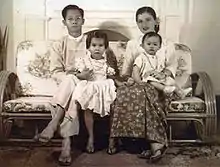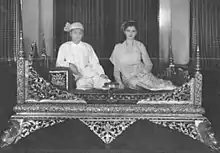Inge Sargent
Inge Sargent, also Sao Nang Thu Sandi (Burmese: စဝ်သုစန္ဒီ; born Inge Eberhard on 23 February 1932), is an Austrian-American author, human rights activist and founder of social organizations. She was the Mahadevi (queen consort) of the Shan State Hsipaw and the wife of Sao Kya Seng, the last ruler Saopha of Hsipaw.[1][2]
| Mahadevi Sao Nang Thu Sandi | |
|---|---|
 young Inge Eberhard (Sao Nang Thu Sandi) | |
| Queen consort of Hsipaw | |
| Reign | 7 March 1953 - 2 March 1962 |
| Successor | position abolished |
| Born | Inge Eberhard 23 February 1932 Kärnten, Austria |
| Spouse | Tad Sargent (m. 1968) |
| Issue | Sao Kennari Sao Mayari |
| Dynasty | Hsipaw State |
| Religion | Theravada Buddhism |
| Occupation |
|
Early life

She was born on 23 February 1932 in Kärnten, Austria. When she was six years old, the Nazis invaded her home in Kärnten, and even arrested her mother three times.[3][4]
After World War II, life was hard in Austria, and she decided to study in the United States. In 1951 she won one of the first Austrian Fulbright Scholarships and enrolled at a Colorado Women's College.[3][4]
Queen consort
At a party for international students, she met Sao Kya Seng, a Burmese engineering student from the Colorado School of Mines. She fell in love and they were married at the home of a friend, in Colorado at 7 March 1953. After Sao Kya Seng graduated, the couple sailed to Burma to start their new life. When they arrived at the port of Rangoon, she saw hundreds of people gathered. It was then that her husband told the truth, that he was the Prince of Hsipaw. She became Mahadevi of Hsipaw.[3][4][5][6]

She learned to speak the Shan and Burmese language and worked tirelessly to improve life in Hsipaw. She became involved in charitable projects such as establishing birthing clinics, teaching villagers better nutrition, and starting a trilingual school. After nine years as rulers of Hsipaw, the couple had two daughters, Sao Mayari and Sao Kennari. The couple's altruistic efforts quickly made them two of Southeast Asia's best-loved rulers.[3][4]
In 1962, the Burmese army staged a coup under the leadership of General Ne Win. Eberhard's husband was arrested and imprisoned. She and her two daughters were put under house arrest for two years on suspicion of Eberhard being a CIA spy. During these years, she worked tirelessly to discover what happened to her husband, but eventually she learned that he had been killed in prison. She fled with her daughters to Austria with the help of an Austrian ambassador.[3][4]
After living with her parents for two years, she decided to return to Colorado and she became a high-school German teacher at Centennial Junior High School and Fairview High School, both in Boulder, CO. She retired from her teaching career in 1993.[3][4][7]
Second marriage
In 1968, Eberhard met and married her second husband Tad Sargent, who encouraged her to write her biography. Her memoir Twilight over Burma was published in 1994. All profits from her book are donated to Burmese refugees living near the borders of Myanmar.
She says writing it was a cathartic experience. "Before I wrote the book I used to have nightmares of running with my two little girls while bullets flew past us. But since finishing the book, the nightmares have ended".
In 1995, Eberhard and her husband established the Burma Lifeline Foundation, a charity that aimed to raise funds to help those fleeing the military regime in Burma.
In 2000, she was awarded the International Human Rights Award for her continued support for ethnic minorities and a charity devoted to helping Burmese refugees survive in countries bordering Burma.[8] She appeared in the movie The Last Mahadevi in 2000.[3][9][10][11]
In popular culture
Inge Sargent wrote a book, Twilight Over Burma: My Life as a Shan Princess, in 1994 about her first marriage and life in Burma.[12] The book became the film, Twilight Over Burma in 2015, in which she was played by Maria Ehrich and also starred Daweerit Chullasapy.[13] The film was banned in Myanmar.
Quotes
"Regimes like the one in Burma can't last forever. As long as there are people who desire something better, then there is always a chance for change."[14]
"I am connected to the Shan people of Burma, I've lived with them — and lost my heart there. How can I not help them? Someone has to help them."[11]
Books
- Twilight Over Burma: My Life as a Shan Princess (1994)
- The Prince of Hsipaw: A True Story of Burma (1992)
Films
- The Last Mahadevi (2000)[15]
References
- "Movie on Shan prince and his Austrian wife shines light on Myanmar's 1962 coup". Mizzima. 2 June 2016. Retrieved 18 September 2017.
- "Biography". Unionsverlag (in German). Retrieved 18 September 2017.
- "INGE SARGENT: BURMA'S AUSTRIAN PRINCESS". InsideAsia Tours. 23 June 2016. Retrieved 18 September 2017.
- "Plötzlich Prinzessin". oeamtc (in German). 15 March 2016. Retrieved 18 September 2017.
- "The last prince of Hsipaw". Frontier Myanmar. 25 April 2016. Retrieved 18 September 2017.
- "Former Prince of Hsipaw Honored in Colorado". Burmese News International. 9 October 2015. Retrieved 18 September 2017.
- "Interview with Inge Sargent". burgenland.orf.at (in German). 22 October 2015. Retrieved 18 September 2017.
- "International Human Rights Award". UNA-USA Boulder County Chapter. Retrieved 18 September 2017.
- "Waylon Lewis of elephantjournal.com; a conversation with Inge Sargent: The Last Mahadevi (Queen)". Elephant Journal. 18 February 2009. Retrieved 18 September 2017.
- "Interview video". DVB Tv YouTube. 27 June 2011. Retrieved 18 September 2017.
- "Former Burmese Princes Works to Help Her People". Go World travel. Retrieved 18 September 2017.
- Sargent, Inge (1994). Twilight Over Burma: My Life as a Shan Princess (Paper ed.). Honolulu: University of Hawaii Press. ISBN 0824816285. Retrieved 8 July 2016.
- "Twilight Over Burma". iMDB. 2015. Retrieved 8 July 2016.
- "Inge Sargent". Do One Thing. Retrieved 18 September 2017.
- "The Last Mahadevi Film". Holly Wood. Retrieved 18 September 2017.